Iranian Hardliner Says Bodybuilding Is Nudity, Should Be Banned
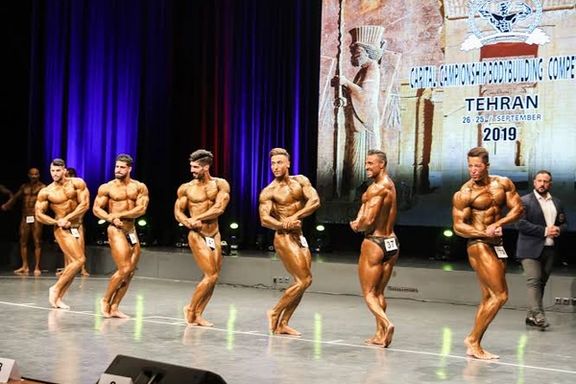
One of Iran’s hardline conservatives Mohammad Sadegh Koushki has called on President Ebrahim Raisi to suspend bodybuilding competitions.

One of Iran’s hardline conservatives Mohammad Sadegh Koushki has called on President Ebrahim Raisi to suspend bodybuilding competitions.
His comments come after an incident at Iran's bodybuilding championships, during which Reza Beiranvand, a participant, expressed his protest against the judges by striking pictures of those killed in the Iran-Iraq war with his foot.
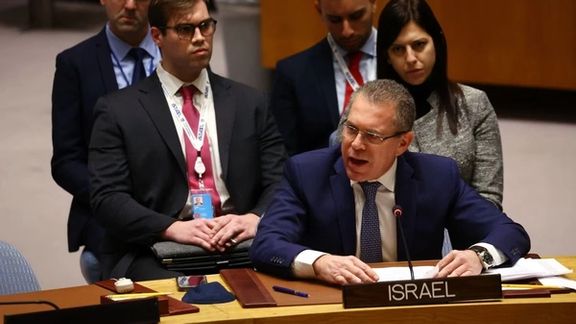
Israeli Ambassador to the UN, told Iran International, “It’s unacceptable that… they treat a mass murderer, the Butcher of Tehran, President Raisi, with a red carpet.”
Speaking on the sidelines of the UN General Assembly in New York, Gilad Erdan said, “he cannot be so respected here while he’s oppressing, executing, murdering his own people.”
Ebrahim Raisi was a member of the infamous Death Committee which oversaw summary execution of up to 5,000 thousand Iranian political prisoners in 1988.
Raisi’s speech at the UN General Assembly last Tuesday coincided with the first anniversary of the killing of Mahsa amini.
Amini was a 22-year old women arrested in Tehran because the police felt her hair wasn’t covered properly. She was hit on the head in custody and died in hospital on 16 September 2022.
Her killing sparked a wave of protests that challenged the foundations of the Islamic Republic like never before. More than 500 protesters were killed, and thousands injured by armed forces and thugs loyal to the regime. Security forces arrested 22,000 people and seven protesters were hanged.
Ambassador Erdan made headlines a few days ago when he held up a poster of Mahsa Amini with the caption “Iranian women deserve freedom” during Raisi's speech at the General Assembly.
“It’s quite sad to see the people in Isfaham don’t have water and all the money is spent on weapons of mass destruction, on arming their terrorist proxis in the region,” Erdan said in a chat with Fardad Farahzad of Iran Internation TV in New York.
He did reiterate the Israeli position that the regime in Iran and its nuclear ambitions should be a source of concern for “the entire world” but also a blessing in disguise.
“In some ways we should be thanking Iran,” Erdan said, “because they’re one of the reasons why all the moderate countries in the region that are looking to the future and care for their children, they are creating an alliance.”
Arab-Israeli relations have improved significantly in recent years. It was one of the major topics of discussion when Benjamin Netanyahu and President Biden met on the sidelines of the UN General Assmebly.
Netanyahu expressed optimist in that meeting that a “historic peace between Israel and Saudi Arabia” can be reached under Biden’s “leadership”.
The sentiment was echoed by Saudi Crown Prince Mohammad bin Salman in a rare interview with Fox News that was aired 20 September.
“Every day we get closer,” he said, when he was asked about the normalization of relations with Israel.
Ambassador Erdan emphasized the significance of this remark in his interview with Fardad Farahzad.
“These statements are historic. You could never hear the leader of Saudi Arabia saying these things publicly. And obviously when the President of the United States feels that he can also talk about it, it means that they know that it’s a matter of time.”
In the same interview with Fox News, the Saudi Crown Prince said that if Iran gets nuclear weapons, “we have to get one, for security reasons, for ballancing power in the Middle Ease. But we don’t want to see that.”
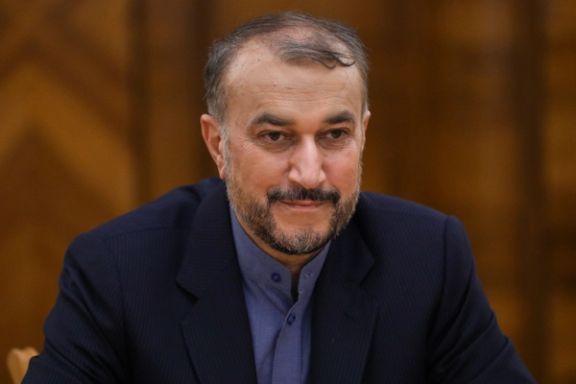
Iran’s foreign minister Hossein Amir-Abdollahian told UN General Secretary Antonio Guterres that diplomatic contacts continue to revive the JCPOA nuclear deal.
Amir-Abdollahian, stated that communications with the United States are taking place, and an initiative by Oman remains on the table. If the other parties are willing, Iran is determined to return to the JCPOA (Joint Comprehensive Plan of Action).
The Iranian foreign minister met with Guterres, the Secretary-General of the United Nations, at the UN headquarters in New York on Friday.
The diplomatic efforts of the United States and Europe to address the Iranian nuclear issue come at a time when Israel considers these actions insufficient and emphasizes the need to increase pressure and resort to serious military threats.
Negotiations to resurrect the JCPOA, which former US President Donald Trump abandoned in 2018, collapsed about a year ago. Washington has been exploring alternative approaches to encourage Tehran to curb its nuclear program. Recently, the Biden administration released a total of $8.7 billion in Iran’s funds blocked in Iraq and South Korea.
Amir-Abdollahian also had a meeting with his Saudi counterpart in New York. According to the Iranian Ministry of Foreign Affairs, where the two sides discussed bilateral relations and regional issues.
Saudi Crown Prince Mohammed bin Salman, in an interview with Fox News on Thursday, highlighted the danger posed by Iran potentially acquiring nuclear weapons. He stated, "If they obtain one, we'll have to acquire one for security reasons and to maintain the balance of power in the Middle East. However, we do not wish to see that happen."

Iran has stationed 10 brigades of its traditional army’s ground forces along its borders to deter “enemies” Gen. Kyumars Haydari was quoted as saying on Sunday.
Gen. Haydari did not clarify if these forces all belonged to the army or also included unites from the Revolutionary Guard’s ground forces. He also did not provide a numerical estimate of the forces, but a brigade is usually around 3,000-4,000 troops.
The Islamic Republic has maintained its traditional army while heavily investing in the Revolutionary Guard that in many respects commands stronger and better trained units.
Gen Haydari who is the commander of the army’s ground forces said that these brigades are stationed in the northwest, west, southwest and northeast to confront “enemies”. Iran has been projecting military power along its borders with Iraq to deter what it calls separatist Kurds using Iraqi territory as a base.
With recent clashes and tensions between Armenia and Azerbaijan, Iran’s northwestern neighbors, Tehran has also sent forces to the area possibly to deter Baku from invading southern Armenia and cutting Iran off from its friendly neighbor.
Iran has also faced intermittent incursions and hostile fire from the Taliban in the northeast, who have cut off waters from a major river flowing across the border, depriving vast arid swaths of territory from its traditional source of irrigation.
Haydari, however, said that the deployment “does not mean an immediate danger threatens the Islamic regime,” rather it is meant to boost readiness and to be in a better position to monitor the borders. He added that it is important for ground forces to “to feel themselves in the trenches,” according to the commands of Iran’s Supreme Leader Ali Khamenei.
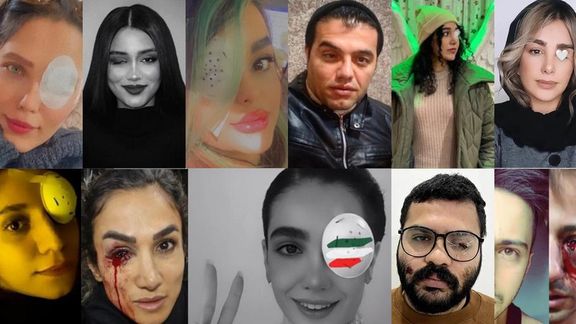
Iran Human Rights (IHR) says analysis of protester deaths and eye injuries reveals that women’s eyes and faces were intentionally targeted during last year’s protests.
In a new report, the Oslo-based non-profit based its argument on statistical data gathered about the protests that began in mid-September 2022 and spread across the country. “Women made up 9% of slain protesters and 28% of those who sustained eye injuries,” the report said.
Security forces in Iran use a shotgun shell known as ‘bird shot’ with small metal pellets that is less likely to kill from a distance but can indiscriminately blind people in a crowd. In November 2022, dozens of ophthalmologists warned against the use of shotgun ‘birdshots’ and other projectiles by Iran’s security forces that they said had blinded over 500 protesters since mid-September.
The number of injured men and women should be proportionate to those who participated in the protests if the shootings were not intentional, IHR director Mahmoud Amiri-Moghadam told Iran International.
“In Mahabad, 15 percent of those killed are women, while more than half, i.e. 56 percent of eye injuries, were sustained by women,” he said, adding that these figures can only be explained by assuming that security forces intentionally targeted women’s faces and eyes.
“[This shows that] an order had come from above to torture these women and ruin their lives, teach them a lesson to cover their faces and heads for the rest of their lives. I think this shows the seriousness of these crimes, even more serious than we thought because it is a pre-planned, targeted crime, far more serious,” he said. “What they did to women by shooting them directly in the face and eyes was not just inflicting bodily harm, it was also a kind of mental and physical torture, and their goal was to terrorize them.”
Intentional aiming at protesters’ faces and tens of cases of serious eye injuries was first reported during a crackdown on water protests in Isfahan in December 2021.
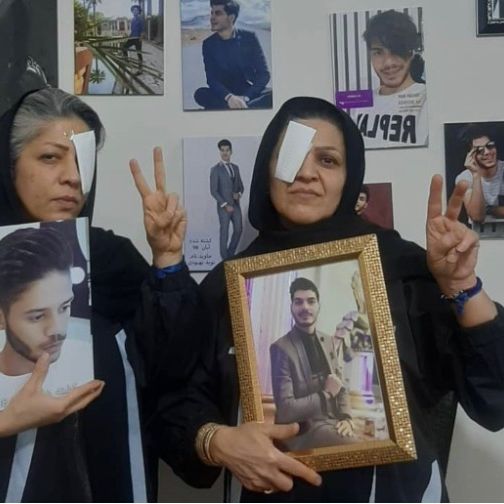
To justify shooting pellets and plastic bullets at protesters which in hundreds of cases caused serious eye injuries, even blindness, authorities argue that security forces were forced to shoot at protesters to stop them from causing harm to others or damaging public property.
The organization has published 95 cases of eye injury and blindness from last year’s protests with names, photos and injury descriptions. Amiri-Moghadam says documenting what happened to the wounded is difficult because they and their families are threatened by security and intelligence bodies. “In 43 cases, we withheld the names.”
Intentional targeting of genital areas was also reported in 2022 protests.
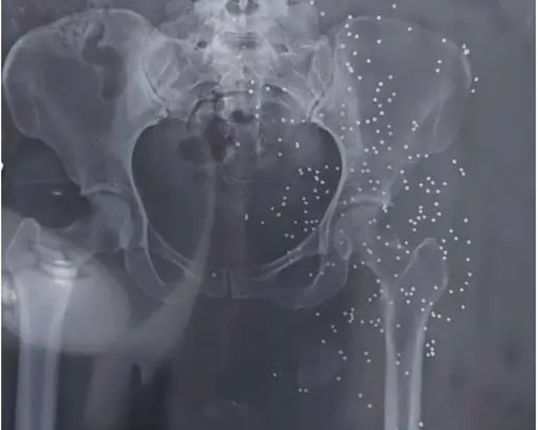
“The international community has formed a fact-finding committee, but what they can do is limited because they are not allowed entry into Iran. What they can do depends on how much documentation they can get. What these eye victims did is important for preventing the repetition of these crimes in the future,” he said.
According to Amiri-Moghadam, the international community will find making more concessions to the Islamic Republic difficult if the fact-finding committee comes to the conclusion that a crime against humanity has been committed and they will be pressured to demand accountability from the leaders of the Islamic Republic.
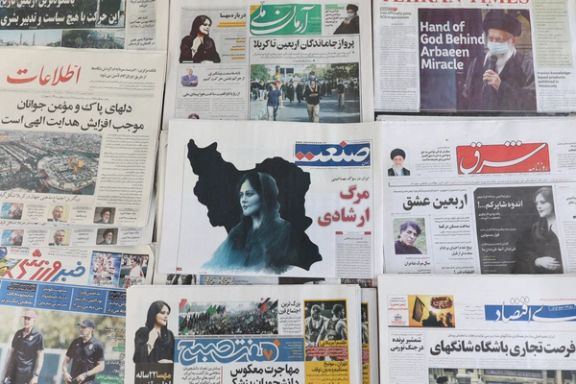
The International Federation of Journalists has issued a warning regarding Iran's recent decision to mandate professional licenses for journalists.
On September 18, the Iranian government announced its intentions to establish a licensing system for journalists operating within its borders. Culture Minister Mohammad Mehdi Esmaili disclosed the government's plan to introduce an accreditation system for journalists. While specific details and dates have not been publicly disclosed by the authorities, if the proposal advances, no journalist will be allowed to practice the profession without obtaining a government license.
Anthony Bellanger, the Secretary-General of the IFJ, emphasized that the implementation of the decision would grant exclusive authority to the government in issuing professional licenses, significantly constraining the activities of journalists operating in Iran.
“The licensing system that the Islamic Republic is planning, that will fall under the total control of the Iranian government, seeks to further tighten its grip on journalists. We totally oppose its implementation and remind the Iranian authorities of their international obligations towards human rights and freedom of speech. Journalism is not a crime, and the Islamic Republic must release all jailed journalists and media workers in the country,” added Bellanger.
The development came shortly after the first anniversary of widespread anti-government protests and a harsh crackdown on journalists and media covering the events. According to an IFJ report published September 15, 2023, at least 100 journalists were arrested and imprisoned in Iran over the past year.
According to the report, six of these journalists, including Niloufar Hamdi and Elahe Mohammadi, who covered the death news about thr death of Mahsa Amini, are still in prison.
Koushki, known for his conservative stance and prior criticisms of athletes, voiced his concerns on his Telegram channel. He deemed bodybuilding competitions “shameful, and a sort of nudity” and asserted, "When the very essence of a competition contradicts ethical values, it is only natural that such events may lead to disrespect for martyrs." Addressing President Raisi, he questioned the issuance of permits for these competitions and the absence of preventive measures.
On the other hand, Amirhossein Ghazi-Zadeh Hashemi, the head of the Martyrs Foundation, condemned Beiranvand's actions, describing them as "disrespectful behavior towards the images of martyrs." He called on the Minister of Sports to take appropriate action against the athlete.
Abdolmahdi Nasirzadeh, the head of the Bodybuilding Federation also offered insights into the incident, saying, "Beiranvand's actions stemmed from his frustration with the judges' decisions, although he was unaware that he was kicking images of martyrs. Upon realizing his mistake, he promptly issued an apology."
In response, the disciplinary committee of the Bodybuilding Federation swiftly imposed a two-year ban on Beiranvand and another protesting bodybuilder, Kianoush Khorramipour, who also expressed dissatisfaction with the judges' decisions during the competition.






